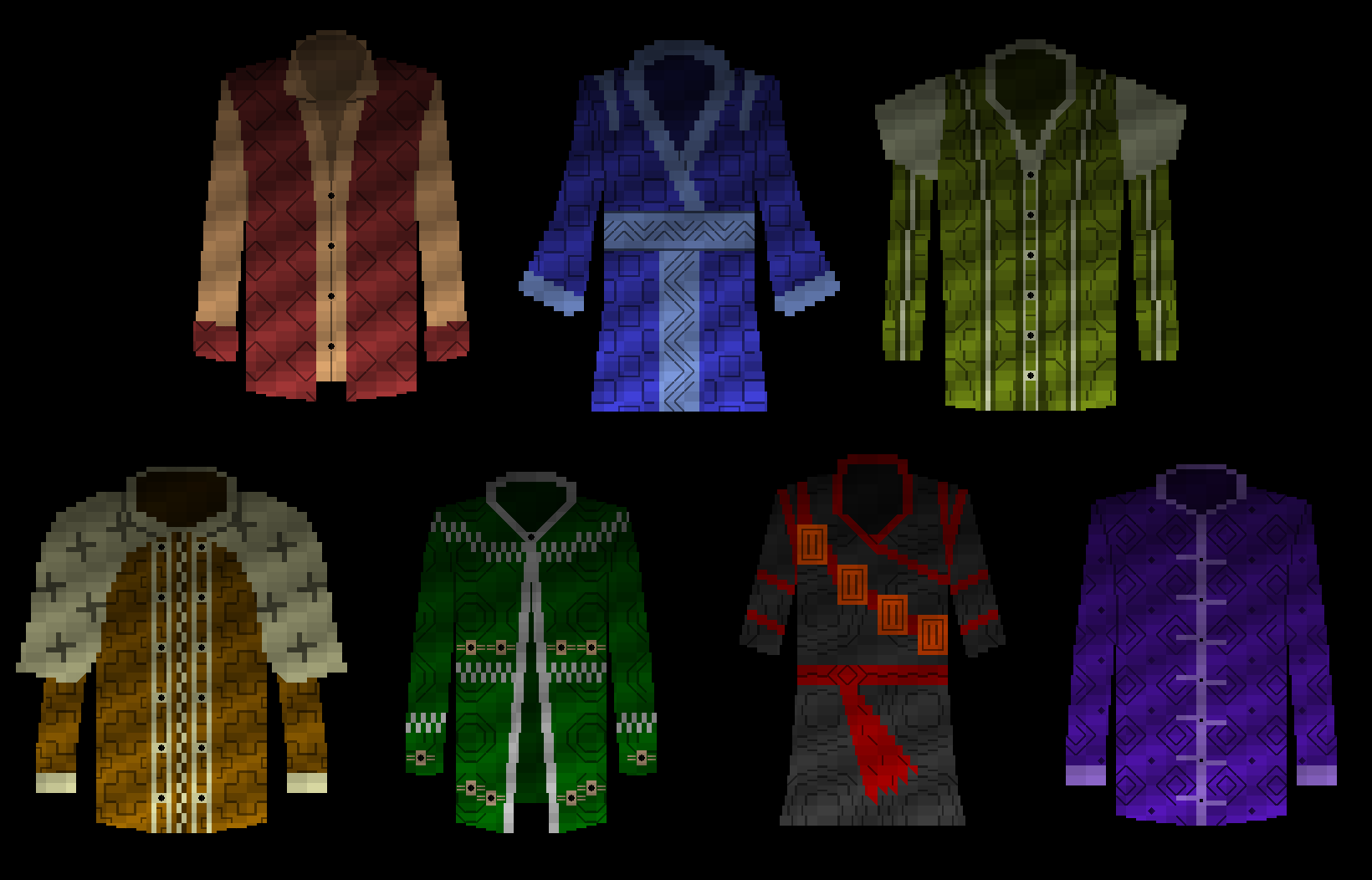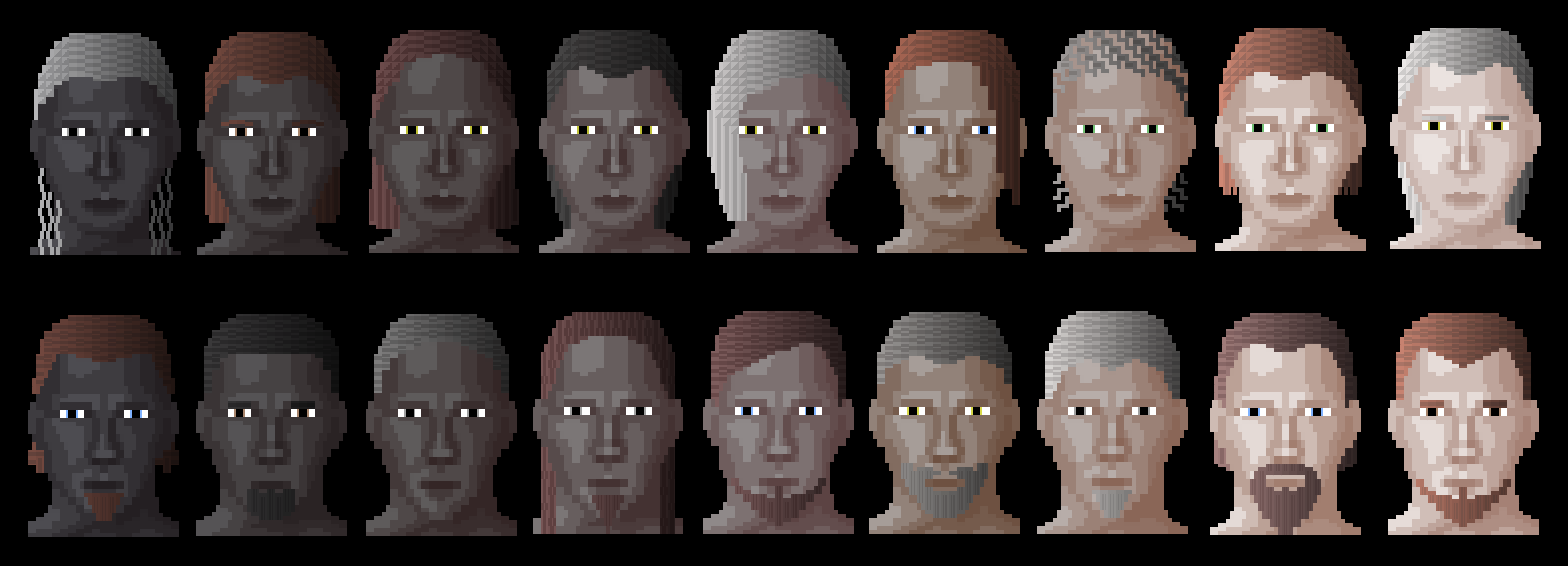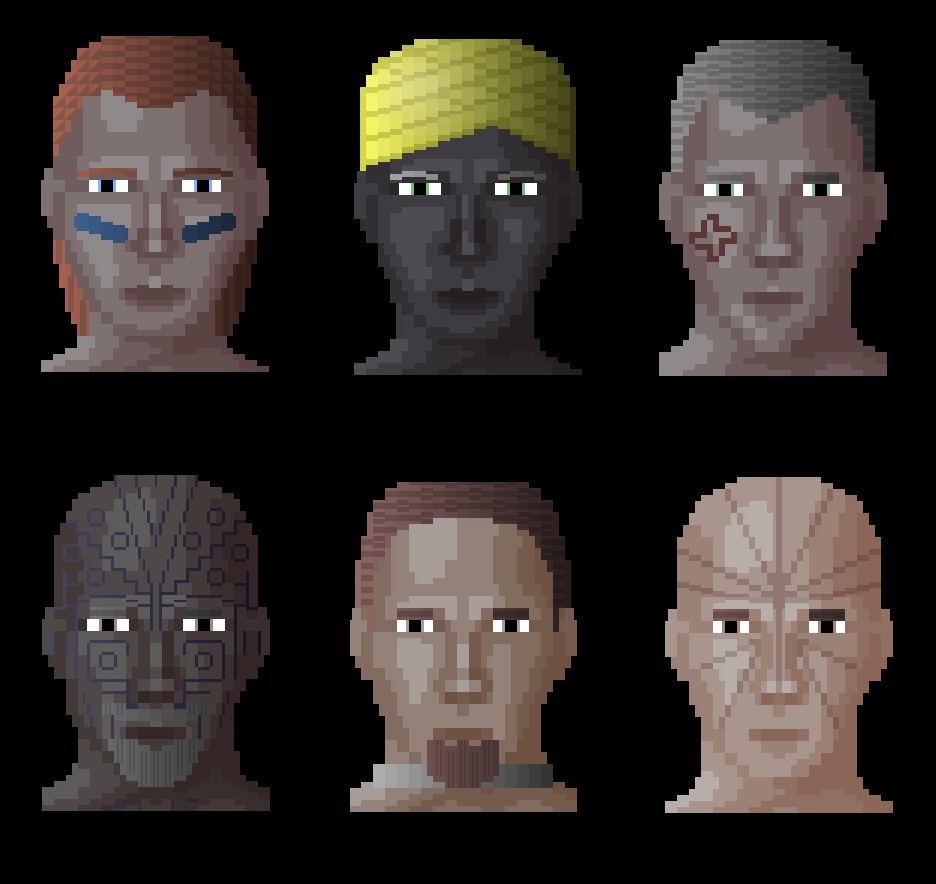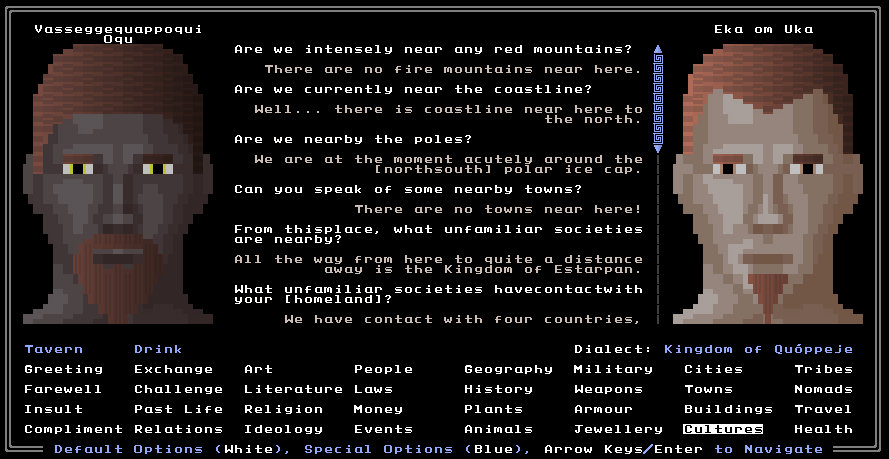This fortnight I’ve been working on getting the entire basic underpinnings of the conversation system finished; I’ve made a lot of progress, not quite enough to show off all the screenshots I’d like, so like last time, I’d rather wait until I can do a nice screenshot-heavy update, which will be next time (whenever that is!).
Instead, I’m going to talk a bit about the second thing I’ve been working on. I’ve now started developing the system by which NPCs will make judgements about you, the player, and where you come from. There are five elements to this: your clothing, your jewellery (meaning what rings and necklaces you are wearing, if any), your skin tone, your facial appearance (scarification, tattoos, headscarves, turbans, that sort of thing), and how you talk. The last one of these I’ve talked the most about in the past, but in this entry I’m going to do a little bit of an overview of how I see all of these functioning, and what it’ll do for the game. Equally, however, I now find myself faced with a big problem: what if all five elements of a player’s appearance suggest different origins or statuses? How should the NPC respond? I have a few notions, but I’m very open to suggestions.
Anyway, without further ado:
Clothing/Armour/Weapons
Other NPCs will make a range of judgements about the player based on the clothing they wear (and, later, the armour they wear, and weapon they wield). I think this will have three elements: what nation they seem to be from, their potential wealth, and whether their clothing denotes any kind of special affiliation, such as a religious order or military organisation. Most NPCs will likely treat you with more deference the more impressive the clothing you wear, but of course wearing the clothing style of a hated nation is likely to have the opposite effect no matter the wealth you’re showing off. For religious clothes, I’d like to have NPCs assume you’re a priest or a monk if you’re wearing obviously religious garb, although such garb will obviously have significant negative effects in certain areas of the game world; at the same time, though, it might encourage a particularly zealous shopkeeper to give you a discount, for instance. However, if people ask for religious advice and your character doesn’t know anything about the religion they are masquerading a priest of… that might be a little suspicious. Once armour is in the game that will also affect people and how they respond to you, probably with a little fear, a little deference, but again depending on the specific situation. Wearing unknown clothes should also elicit some kind of response depending on the nation/people; friendly and inquisitive if a very open and cosmopolitan nation, scared if isolationist, etc…
Jewellery
Jewellery will appear at some point in the near-ish future, and will consist of rings and necklaces. These will be similar to clothing: there will be cheap, middling, and pricy rings and necklaces available for each nation, and special/unique rings and necklaces for religions, religious orders, various other factors, various ranks in various organisations, and these sorts of things. Right now, I think special jewellery will be available for religions, houses/noble families, monarchs/rulers, but that’ll probably be it (and then more generally, as above, across cultures). I therefore see these as having a very similar set of relationships as clothing, but also denoting several things (such as family affiliation) which clothing does not; although most will be standard jewellery items for the culture in question.
Skin Tone
Skin tone varies very widely in URR, and is inevitably a central method by which peope might make judgements about the origin of the player character. This has only one element, which is to say a geographical assumption: NPCs will consider your skin tone, estimate how close/far from the equator you originate, and then look at their knowledge of nations and take a guess at which one you might be from. As such, there will also be some way to temporarily alter and mask your actual skin tone and make it lighter or darker as part of trying to blend in in other societies; and, of course, with some skin tones you’ll be able to “pass” for a citizen of many countries, most likely, whereas a clothing style would only allow you to pass for one. Hopefully the intersection of these (and the other elements below) will allow for some interesting combinations and strategic decisions.
Facial Appearance
Facial appearance, meanwhile, is a binary element: it denotes the overall culture someone comes from, and that’s it, although in a small number of cases it might also denote rank, slavery, and so forth. Again, if people recognise the markings they will suspect you are from the appropriate culture; if they don’t recognise the markings, the same range of responses mentioned earlier might play out. Again, I’ll be introducing ways to fake some markings (though probably not others?) as a means of further disguising yourself.
How you Talk
We’ve discussed this several times before on this blog, so I’ll keep it brief here, but the way in which you speak is going to be crucial. NPCs will make judgements about your origin based on what you say and how you say it, whilst you’ll be able to fake speaking in other dialects to a greater or lesser extent based on your knowledge of that dialect at the point you’re having the conversation. This will often be a make-or-break point for any player/player character attempting to “fake” their way into/through a particular culture or particular social situation, and is one of the aspects that’ll appear in 0.8 – NPCs won’t respond to it yet, but you will be able to change dialects, and see the results.
Summary
These are the five major elements I see as contributing to how other NPCs see the player – the first four being literally how they see the player, and the last one of course only coming into the equation if you start talking to the NPC (or the NPC starts talking to you, which is a feature that definitely needs to be implemented in the near future). I think these will give the player ample methods for crafting an image useful to them at that moment,
But what happens if 50% of your elements suggest you are person A of rank B from culture C and religion D, but the other half of your clothing suggests you are person W of rank X from culture Y and religion Z, which is the absolute opposite? Should they take an educated guess? Should they comment on how you are dressed, and that you are dressed strangely? What if they have particularly strong feelings towards/against A/B/C/D/W/X/Y/Z? Or what if 90% of your visible elements suggest X, but then you have a single element suggesting Y? Should the NPCs focus entirely on Y? Should they assume you are X and just treat Y as a strange element? Does that depend on the nature of X and Y and the context in which you are meeting another NPC? My point from all of these questions is that it’s proving very difficult and complex to decide, in essence and in one sentence, how NPCs should add up the elements of “you” they are presented with and how they should subsequently come to a judgement. This is what I’d love any and all of your thoughts on below; this system isn’t going to be implemented in 0.8, because I’m really trying to get only the core essentials of the conversation system done before release, but it’ll be a crucial element of the fast and much shorter 0.9 which will be finishing off the conversation system straight after. What do you think?
Updates
As I’ve said before, I’m crunching on finishing my first book, and about to travel for six weeks through various visiting fellowships; I am hard at work coding, but right now I’m finding fewer blog updates is really helping me with game developments, so we’ll be sticking to uncertain update schedules until my book is finished and submitted (May 31). I know this is rubbish, folks, and I wish I had some more time, and I hate how long URR 0.8 is dragging on for, but I’m doing the absolute best possible in the present situation. Next update: asap!





Social Justice Warriors are going to be furious - Ultima Ratio Regum now features White Privilege, Cultural Appropiation, and Stereotypes.
So [Triggered] - Much Media Coverage - So Outrage
xD